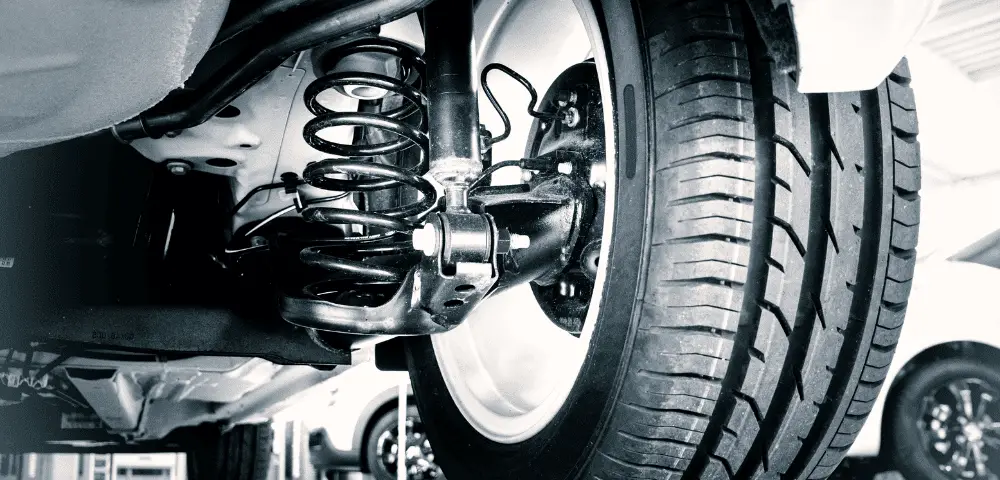The control arm is a functional part of your car that connects the wheel hub and steering wheel to facilitate maneuvering on the road.
It has a bushing on one side, which can deteriorate with time.
So, how long should you wait before replacing the bushing? The answer is now! Any delay in repairs can cause a lot of problems in the long run.
Read on to learn more about why it is so.
Deterioration of the Control Arm: Why Does it Happen?
One of the first questions that come to anyone’s mind is what if the deterioration of the control arm is preventable. Is there any way to eliminate it?
The short answer is no; you can slow down the process if you’re careful but completely eliminating the chances is out of the question.
As to why it happened. The answer is nature.
Bushings, joints, and other components are made up of rubber or metal which resist corrosion to an extent.
This allows the components to have a decent working lifespan but you have to replace them regularly.
In most cases, the costs of these processes are minimal and they don’t need too much time as well.
However, ignoring this part of the maintenance can cause a lot of issues, and some of them can be very serious.
Common Giveaway Signs of a Failing Control Arm
Control arm bushings don’t fail suddenly. The process is gradual and gives you a lot of signs.
You’ll notice a significant wobble, unnatural sounds, and some other issues when you move at high speeds at the start.
Additionally, you’ll notice a lot of misalignments of the wheels as well, which would cause your car to vibrate uncontrollably on the road.
In addition to the aforementioned issues, here are some of the most common signs of a failing control arm, which means that you need to check the bushings or the ball joint.
1. Instability
The control arm is responsible for maintaining your car’s sense of direction.
With a worn-out bushing, your steering wheel will become completely unpredictable, leading to a plethora of issues ranging from pulling on one side to a complete inability to maneuver the car.
In most cases, things won’t go to that extreme because driving will become so hard before it that you’ll have no choice but to replace the component.
Generally, the direction of the pull indicates which side’s control arm is damaged, but you can visually inspect it to make sure as well.
2. Knocking Sounds
The bushing is responsible for absorbing the impact coming from the road and reducing any metal-to-metal contact while driving.
This won’t be possible when the bushing is worn out. That’s why you’ll start hearing a clunking or knocking sound on the road, which will be more prominent while turning or going over small bumps.
3. Unnatural Tire Wear
Uneven wear on the tires happens because of multiple reasons and a bad control arm is one of them.
Generally, abnormal tire wear because of a bad control arm happens a lot later than other signs, so you won’t see it much.
If you see unusual tire wear, you should check your inflation level, alignment, and other suspension components including the control arm.
4. Loosened Control Arm
This one is obvious. A loosened control arm means that your bushing has deteriorated completely.
If you ever feel like that, you’ll have to immediately consider repairing the component. To check the control arm, give it a slight push. The control arm should be very stiff and free from any play.
In many cases, the ball joint also fails. When that happens, you’ll be able to move the ball joint up and down easily with virtually no force.
In addition to checking for the bushing, you should also check for the ball joint. Any flaw in that will have the same consequences.
5. Visual Signs of Failure
Any visual sign of failure in the control arm also indicates an issue with the joints or the bushing.
The bushing for example absorbs the force coming into the car. If it fails, the entire force is absorbed by the control arm itself, which results in bending or even breakage in some cases.
Control arms are generally made up of subpar materials as they are replicable, so they can’t sustain too much impact from the road.
The Overall Cost of Replacing a Control Arm Bushing
The overall cost of the replacement ranges from $50 to $75 which may sound a lot low given how important the control arms are for your car.
The actual cost depends on the nature of the damage, the number of wheels you want to cover, the expertise of your mechanic, and much more.
However, no matter how high it goes, the overall cost will still remain negligible when compared to the overall financial consequences of ignoring the repairs.
What’s the Average Lifespan of Control Arm Bushings?
Generally, the overall lifespan is anywhere between 85,000 to 100,000 miles.
However, the road condition, your driving style, the potholes you deal with, and others are some of the most significant factors that can cause deterioration unexpectedly.
Another important thing to remember is that it’s always recommended to change your control arms if the vehicle has been in an accident.
Another vehicle ramming into yours can put a lot of pressure on the control arm of your car.
This can create a lot of stress on the control arm and may cause it to break or bend prematurely.
How to Tell Which Control Arm is Bad?
The control arm directly affects the maneuvering of your car and any damage to it can pull it in one direction.
Generally, the direction of the pull shows which control arm is damaged.
Simply put, a pull on the right side means that the right control arm is bad while the pull on the left side means something else.
Can I Replace the Control Arm by Myself?
If you are not a trained mechanic, then the short answer is no!
The control arm is an integral part of your vehicle and you must ensure that the repair work is 100% perfect.
That’s why it’s very important for you to visit a mechanic for a control arm replacement.
Doing so yourself can be very risky because any mistake in the process can cause your car to break down in the middle of the road.
What Happens if a Control Arm Breaks While Driving?
Naturally, it would be catastrophic for your car.
If you are at a very high speed, then the resulting accident can even be fatal. Generally, the chances of your control arm breaking in the middle of the journey are slim or next to none. The worst it could do is bend.
Any damaged control arm will make so much noise and show other signs of failure that you’ll naturally replace it before that time comes.
However, bend control arms are still very dangerous.
So, the best course of action is to regularly visit your local mechanic for a full-suspension check and to keep an eye on key components like the control arm.
Key Takeaways
The suspension components of any vehicle are like a lifeline for it when it comes to movement. Control arms in your car maintain maneuverability and the sense of direction for your vehicle.
If the control arm bushings deteriorate, which is a natural process, you’ll immediately start noticing the distinct sign of failure.
The best course of action is to never ignore such issues. Immediately schedule a visit to your mechanic and get your car checked.
Spending something around $100 can save you from a lot of hassle and other dangers of the road.


